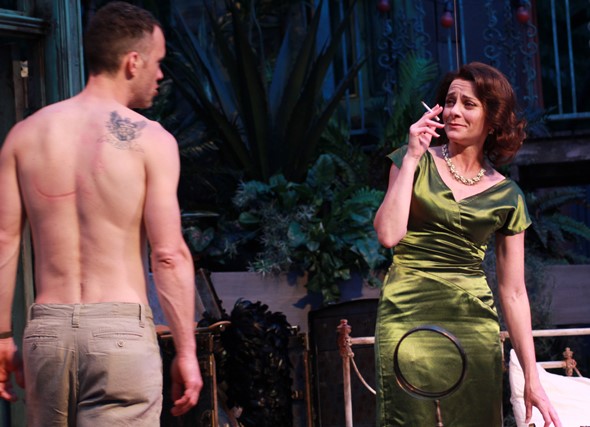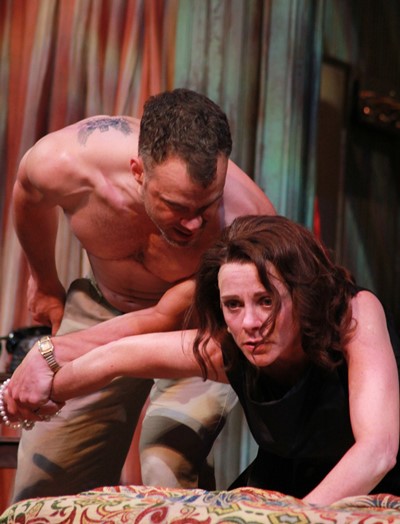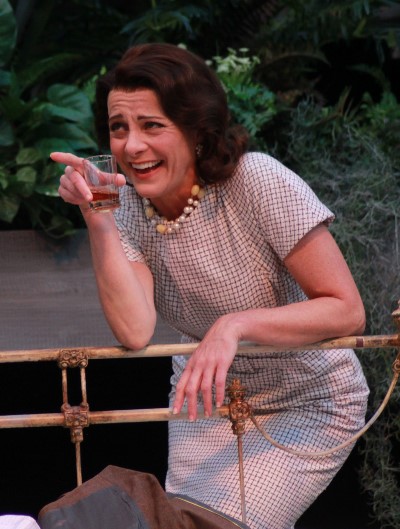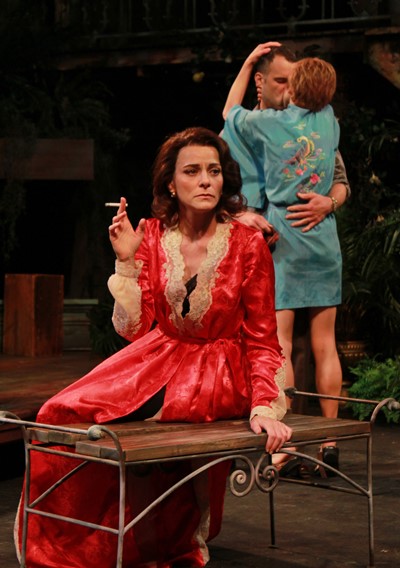Role Playing: Tracy Michelle Arnold debunks madness as force that drives Blanche DuBois
 Interview: Actress argues for pluck and cleverness as the worn Southern belle in Tennessee Williams’ “A Streetcar Named Desire,” at American Players Theatre in Spring Green, Wis. Through Sept. 5.
Interview: Actress argues for pluck and cleverness as the worn Southern belle in Tennessee Williams’ “A Streetcar Named Desire,” at American Players Theatre in Spring Green, Wis. Through Sept. 5.
By Lawrence B. Johnson
Tracy Michelle Arnold, who portrays a feisty and resourceful Blanche DuBois in Tennessee Williams’ “A Streetcar Named Desire” at American Players Theatre, doesn’t buy the common perception of this embattled woman as “a crazy person.” Arnold sees Blanche as a scarred fighter who never gives up her struggle to survive, even at the end.
“She has been through so much and yet she’s a survivor,” says Arnold. “The first time I played the role (as a graduate student at Northern Illinois University), I thought of her as someone who has been defeated. “But now I see her quite differently. She has suffered so much, but she just keeps getting up, coming back. She even mantains her sense of humor – as well as her appearance.”
 Blanche shows up on the doorstep of her sister Stella’s meager, bare New Orleans apartment because she has been effectively run out of town at her last stop – fired from her job as a high school English teacher for seducing an under-age boy. She’s also hounded by a crimson reputation for hosting the soldiers at a local military base.
Blanche shows up on the doorstep of her sister Stella’s meager, bare New Orleans apartment because she has been effectively run out of town at her last stop – fired from her job as a high school English teacher for seducing an under-age boy. She’s also hounded by a crimson reputation for hosting the soldiers at a local military base.
What pushed her down that path was a quick succession of traumatic events: discovering first-hand that her handsome new husband was gay, then blurting out a cruel comment that prompted him to put a gun to his head. Blanche saw the result and seemingly never got over it. She keeps trying to recapture her lost chance with other young boys, as if hoping for a different outcome.
“When Blanche arrives at Stella’s home, she has no money and no prospects,” says Arnold. “She has lost her job and her reputation is tarnished. She very quickly discovers that this option isn’t going to work, either. Yet she is exceptional in her drive and her fierce hope. She keeps her wits about her. She’s like a prize fighter who will not go down. She swings with her mind, her words, her sexuality. She must be exhausted.”
 And of course she must contend with Stella’s (Cristina Panfilio) pugnacious husband Stanley (Eric Parks), a pugilist worthy of Blanche’s wiles.
And of course she must contend with Stella’s (Cristina Panfilio) pugnacious husband Stanley (Eric Parks), a pugilist worthy of Blanche’s wiles.
“Blanche has no expectations of Stanley because she’d never met him,” notes Arnold, “so we had to figure out how their relationship would go. Blanche is used to the men she knew back home, and she’s met all types. She wouldn’t waste her time with a man who resorts to violence to get his way. Now she encounters this man who is crass, crude and unapologetic – even proud of it in a way. Then she sees him hit her sister, who is pregnant.
“So how does Blanche deal with Stanley? We discussed this a great deal in rehearsal. She’s very good with men. Her sexuality is one of the tools in her kit, and of course she would use that with Stanley – outside Stella’s presence. Eric and I have played opposite each other many times. We’re very comfortable that way, and not afraid to experiment. The first few weeks, I was working on Blanche as someone who was more afraid of him, intimidated by his animalism – by this creature who doesn’t want to allow me in his space. Then we decided to explore Blanche’s strength.
 “It’s fun to put on different versions of Blanche for Stanley. She’s wonderfully mercurial and constantly morphing. She’s like one of those germs that adapts and adapts again. ‘That way will kill me, so I’ll change.’ And she does this in front of the audience.”
“It’s fun to put on different versions of Blanche for Stanley. She’s wonderfully mercurial and constantly morphing. She’s like one of those germs that adapts and adapts again. ‘That way will kill me, so I’ll change.’ And she does this in front of the audience.”
At stake in the battle between Blanche and Stanley, says the actress, is Stella. Blanche is suffocating in this tiny dump of an apartment where she has slept for months on a cot off the kitchen, her privacy as thin as the curtain that separates her from Stanley and his poker night pals.
“The violence comes from a sense of ownership of Stella,” says Arnold, “and in her mind Blanche has prior claim. Blanche has few options left. She wants Stella to go away with her. But Stella has made a new life, and she’s sticking with Stanley.”
In the end comes the iconic line, as Blanche is being led away to an asylum by an older man and his assistant. Typically read as the distracted words of distraught woman who has lost touch with reality, Blanche says: “I have always depended on the kindness of strangers.” But Arnold puts a stunning spin on it, throwing what becomes an acerbic comment into Stella’s face.
 “From the first rehearsal, I knew I wanted to say that line to Stella,” the actress says. “She knows what she’s saying: ‘I have to look to strangers to take care of me. You left us all. You were never there when all those (family members) were dying and I had to find a way to pay for their funerals.’ I don’t think she’s had a psychotic break. I don’t think she’s out of her wits.
“From the first rehearsal, I knew I wanted to say that line to Stella,” the actress says. “She knows what she’s saying: ‘I have to look to strangers to take care of me. You left us all. You were never there when all those (family members) were dying and I had to find a way to pay for their funerals.’ I don’t think she’s had a psychotic break. I don’t think she’s out of her wits.
“This is a woman who has just been raped brutally by her brother-in-law and still had to live in that house with him for those few days – with the man who did that to her. That’s the woman you see in that last scene, trying with all her might to make lemonade. I suppose it’s the easy way out to say she has gone insane, but I don’t believe it. I have so much sympathy for her. I know how intelligent she is, how hard she has fought. She’s just regrouping to battle again. Maybe she’ll work her wiles on this nice man who has her arm.”
While Arnold acknowledges that playing Williams’ troubled, aging Southern belle outdoors in APT’s Up-the-Hill arena takes a physical toll, she insists she can leave the emotional wreckage on the stage.
“Between the dehydration and having to project through wind and humidity, by the end of a performance my muscles are crazy aching,” she says. “But when a play is written as impeccably as this one, if you can get your dominoes lined up right, it isn’t really hard to perform. All you have to do is walk into that courtyard, and you’re good to go.
“The emotional part I can let go at the end. Anyway, now I can. The rehearsal process was where I carried Blanche with me all the time. But not now. Blanche doesn’t intrude into my life. I have a six-and-a-half-year-old son, a dog, a house. And flowers to water.”
Related Links:
- Review of “A Streetcar Named Desire” at American Players Theatre: Read it at ChicagoOntheAisle.com
More Role Playing Interviews:
- Christopher Donahue, as Ahab, finds sea’s depth in sadness of a vengeful soul
- Lance Baker embodies ennui, despair of fugitive Jews in ‘Diary of Anne Frank’
- Francis Guinan embraces conflict of father who fled from grim truth in ‘The Herd’
- Sophia Menendian reached back (but not far) as plucky Armenian refugee of 15
- Lindsey Gavel’s distressed Masha, in ‘Three Sisters,’ began with a touch of cheer
- Hollis Resnik felt personal bond with zealous, skeptical scholar in ‘Good Book’
- A.C. Smith is ready undertaker, lord of diner world in ‘Two Trains Running’
- Lia D. Mortensen’s intense portrait of a mentally failing scientist holds mirror to life
- Siobhan Redmond sees re-formed Lady Macbeth as valiant queen in ‘Dunsinane’
- Eileen Niccolai harnessed a storm of emotions to create spark in Williams’ Serafina
- Steve Haggard, aiming at reality, strikes raw core of grieving man in ‘Martyr’
- Shannon Cochran found partners aplenty in sardonic, twice-told ‘Dance of Death’
- Natalie West scaled back comedy to nail laughs, touch hearts in ‘Mud Blue Sky’
- Dave Belden, actor and violinist, adjusted pitch for ‘Charles Ives Take Me Home’
- Joseph Wiens starts at full throttle to convey alienation of ‘Look Back in Anger’
- Shane Kenyon touches charm and hurt of lovable loser in Steep’s ‘If There Is’
- Ramón Camín sees working class values in Arthur Miller’s tragic Eddie Carbone
- Hillary Marren’s charming, rapping witch in ‘Woods’ shapred by hard work, free play
- Mary Beth Fisher embraces both hope, despair of social worker in ‘Luna Gale’
- Brad Armacost switched brothers to do blind, boozy character in ‘The Seafarer’
- Karen Woditsch shapes vowels, flings arms to perfect portrait of Julia Child
- Ora Jones had to find her way into Katherine’s frayed world in ‘Henry VIII’
- Kareem Bandealy tapped roots, hit books for form warlord in ‘Blood and Gifts’
- Eva Barr explored two personas of Alzheimer’s victim to find center of ‘Alice’
- Darrell W. Cox sees theater’s core in closed-off teacher of ‘Burning Boy’
- Chaon Cross turned Court stage into a romper room finding answers in ‘Proof’
- Dion Johnstone turned outsider Antony to bloody purpose in ‘Julius Caesar’
- Noir films gave Justine Turner model for shadowy dame in ‘Dreadful Night’
- Anish Jethmalani plumbs agony of good man battling demons in ‘Bengal Tiger’
- Gary Perez channels his Harlem youth as quiet, unflinching Julio in ‘The Hat’
- Kamal Angelo Bolden sharpened dramatic combinations to play ‘The Opponent’
- In wheelchair, Jacqueline Grandt explores paralysis of neglect in ‘Broken Glass’
- James Ridge thrives in cold skin of Shakespeare’s smiling serpent, Richard III
- Stephen Ouimette brews an Irish tippler with a glassful of illusions in ‘Iceman’
- Ian Barford revels in the wiliness of an ambivalent rebel in Doctorow’s ‘March’
- Chuck Spencer flashes a badge of moral courage in Arthur Miller’s ‘The Price’
- Rebecca Finnegan finds lyrical heart of a lonely woman in ‘A Catered Affair’
- Bill Norris pulled the seedy bum in ‘The Caretaker” from a place within himself
- Diane D’Aquila creates a twice regal portrait as lover and monarch in ‘Elizabeth Rex’
- Dean Evans, in clown costume, enters the darkness of ‘Burning Bluebeard’
- Dan Waller wields a personal brush as uneasy genius of ‘Pitmen Painters’
- City boy Michael Stegall ropes wild cowboy in Raven Theatre’s ‘Bus Stop‘
- Brent Barrett is glad he joined ‘Follies’ as that womanizing, empty cad Ben
- Sadieh Rifai zips among seven characters in one-woman “Amish Project”
- Kirsten Fitzgerald inhabits sorrow, surfs the laughs in ‘Clybourne Park’
- Janet Ulrich Brooks portrays a Russian arms negotiator in ‘A Walk in the Woods’
Tags: A Streetcar Named Desire, American Players Theatre, Cristina Panfilio, Eric Parks, Tennessee Williams, Tracy Michelle Arnold


No Comment »
3 Pingbacks »
[…] Tracy Michelle Arnold debunks madness as force that drives Blanche DuBois […]
[…] Tracy Michelle Arnold debunks madness as force that drives Blanche DuBois […]